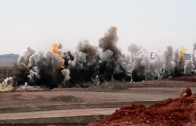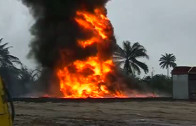The New Rulers of The World
The myths of globalisation have been incorporated into much of our everyday language. “Thinking globally” and “the global economy” are part of a jargon that assumes we are all part of one big global village, where national borders and national identities no longer matter. But what is globalisation? And where is this global village? In some respects you are already living in it. The clothes in your local store were probably stitched together in the factories of Asia. Much of the food in your local supermarket will have been grown in Africa. It’s easier than ever to buy music from Mali, read novels from Colombia and watch films from Iran. The world is shrinking.
But globalisation has not only made the world smaller. It has made it interdependent. An investment decision made in London can spell unemployment for thousands in Indonesia, while a business decision taken in Tokyo can create thousands of new jobs for workers in north-east England. This might seem a very natural development if you live in a country like Britain, with its long international history as a trading nation and imperial power. Bringing the world closer together may throw up new opportunities for cultural and economic interaction, but it also exposes us to the negative aspects of life on a shrinking planet…




